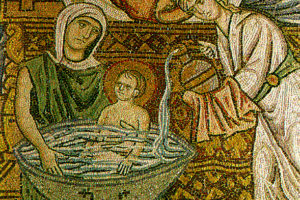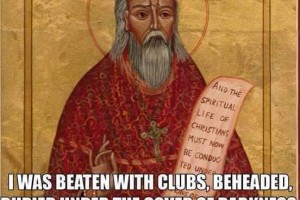As I sat in a hospital’s cafeteria waiting for a ride home, an older person came to talk to me. After the initial chat was out of the way, he proceeded to tell me that I would go to jail for stealing. In jail, all the other women will pull my hair and fight against me. If this wasn’t enough he said that a second neighboring jail full of women, they would come and fight against me too. Then, he left.
I didn’t think of it much since this was not my first rodeo. However, as time went by, like a small seed, fear started to grow. Fear of what? I had no clue, I was simply afraid. So, I texted my friends and explained what happened. One of them immediately texted me a Bible verse that reminded me of God’s presence and power: “Greater is He that is in you than he that is in the world.” When I remembered this truth, I was no longer afraid.
Now, this is all good and well. But what about those who have trouble remembering? Or what about those who have a mental disability in that prevents them from being cognitively sound? How can they resist the devil? Are people with intellectual disabilities at the mercy of the powers that try to control us?
This is hard to answer because there is no clear example of an intellectual disability in the Bible. Scholars have written many books about the marginalized and the oppressed to pave the way to talk about intellectual disabilities. Yet when this is done, one feels like they are trying to make a connection that is not clearly there. So maybe the answer does not lie in the exegetical, nor analytical part of text nor in the cultural-historical context. But on what we experience, it is here that Practical Theology shines.
Many months ago, I went to Edinburgh to visit a community called L’Arche. At L’Arche people with and without intellectual disabilities live alongside each other in communal homes. I had the pleasure of staying at the house of a couple that has been with L’Arche for over 20 years. Once I told them my field of research they proceeded to tell me the story of George.
George came to live at one of the L’Arche houses because no-one would take him. He had no family or friends and was extremely difficult to deal with. He not only had severe autism, was violent, rude, nasty, gross, strong, but had a deep hatred towards himself and others. A peculiar trait that he had was that he was not able to recognize himself in the mirror. One day after several years of living with Gorge, this couple was contemplating the consequences of murder, when they heard a strange voice coming out of Gorge’s room. As they walked into his room they saw George sitting on his bed. As soon as George addressed them they felt a sudden chill. The voice coming out of George was not George’s but a voice that had for lack of a better word “evil” in it. This type of thing and other bizarre things happen a few more times, but it wasn’t until George with supernatural strength twisted and broke the handle of his room door with his bare hands, that the couple called an exorcist.
When the exorcist came and talked with George, he had only one solution for the couple. The exorcist could not perform an exorcism because he believed firmly that if a demon is cast out when it returns it will find George with his heart unoccupied. George’s fate would be worse than his current state (Mat 12:44-45). So, the exorcist gave them a solution: prayer. They needed to stop resenting George, hoping for his death and start covering him in prayer. And that is exactly what they did. They organized daily prayer groups in their house. They prayed with George constantly. After several years George was as peaceful as a dove. George died very old and with a community around him that deeply loved him. The day he died they brought a mirror to him. And as he looked into it, he said: “Ah, there is me.”
Now a lot of things can be asked of this story. Was George saved? Is that why he stopped struggling with demons? How can people with intellectual disabilities become saved if the way to salvation requires us to believe in our hearts and confess with our mouths that Jesus is Lord, aren’t those requirements cognitive? Although these are great questions, they require a bit more information that the story gives. I don’t know if George was saved, neither does the couple who told me this story. I don’t know how salvation works in general. I think it’s a miracle.
What I take away from this is that George’s story, like many others that I have heard over the years, illustrates how the community (the body of Christ) supports and can cover others. If it wasn’t for my friend who texted me a simple verse I would have been dwelling on my fear a bit longer and letting Satan put doubt in me. If it wasn’t for the prayers of an entire community George would have not found peace. Friendship and community carry us because when we are weak others are strong, and that is the church behaving as it should.




Leave a Reply
Your email is safe with us.